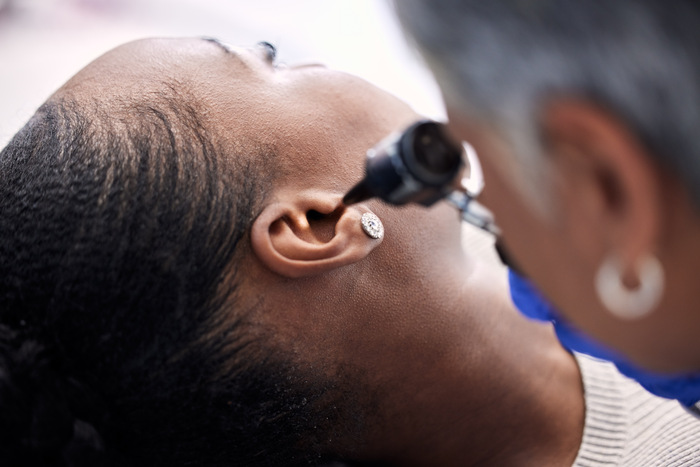
Feel better faster. Get care today.
From the clinic or your couch. Find high quality, same-day urgent care for you and your kids. Book an urgent care visit today.

Clogged ears can be an uncomfortable and frustrating experience, often resulting from a variety of causes such as allergies, sinus infections, or the buildup of earwax, according to the American Academy of Family Physicians (AAFP). This article delves into the common reasons behind ear congestion, highlighting the significance of addressing the issue promptly to avoid complications such as hearing loss or infections. Understanding the underlying causes and knowing how to treat a clogged ear not only alleviates discomfort but also plays a crucial role in preventing future occurrences, ensuring optimal ear health and overall well-being.
Clogged ears can arise from various underlying issues, each contributing to the sensation of fullness or pressure in the ear, according to the AAFP. Understanding these causes is essential for effective treatment and prevention. Below are the main causes of clogged ears:
The Eustachian tubes connect the middle ear to the back of the throat and help equalize pressure. When these tubes become blocked due to allergies, colds, or sinus infections, it can lead to a feeling of fullness in the ears and difficulty hearing as the fluid muffles sound waves from reaching the eardrum.
Ear infections occur when bacteria or viruses infect the middle ear, causing inflammation and fluid buildup. This can create pressure and discomfort, often resulting in a clogged sensation that may be accompanied by pain or fever.
Earwax, or cerumen, is a natural substance produced by the body to protect the ear canal. However, excessive buildup can lead to blockage, trapping moisture and debris, and causing hearing difficulties and a feeling of fullness.
A cholesteatoma is an abnormal skin growth that can develop in the middle ear, often as a result of repeated ear infections, according to the National Institute of Deafness and Communication Disorders (NIDCD). This growth can lead to the destruction of surrounding structures and blockage, resulting in a sensation of clogged ears and potential hearing loss.
When dealing with clogged ears, various treatments can help alleviate discomfort and restore proper ear function, according to the NIDCD. Identifying the underlying cause is crucial for selecting the most effective remedy. Below are several common treatments that can provide relief from clogged ears:
Gently tilting the head to the side or performing movements that encourage fluid drainage can help dislodge trapped fluid in the ear. This method is often effective for those experiencing temporary congestion due to allergies or sinus issues.
The Valsalva maneuver involves closing the mouth, pinching the nose shut, and gently blowing to equalize pressure in the ears. This technique can help open the Eustachian tubes, relieving the feeling of fullness and restoring normal pressure.
Inhaling steam from a hot shower or a bowl of hot water can help loosen mucus and reduce inflammation in the nasal passages and Eustachian tubes. This can lead to improved drainage and relief from clogged ears.
Over-the-counter medications such as decongestants or antihistamines can help reduce swelling and congestion in the nasal passages, which may alleviate pressure in the ears. These medications can be particularly useful for individuals experiencing allergies or colds.
Over-the-counter ear drops can help soften and remove excess earwax, providing relief from blockage. If earwax buildup is the primary cause of the clogged sensation, using ear drops as directed can effectively clear the obstruction.
While many cases of clogged ears can be managed at home, certain symptoms may indicate a more serious underlying issue that requires professional medical attention, according to the AAFP. Recognizing when to seek help is crucial for preventing complications and ensuring proper treatment.
Below are some symptoms that should prompt a visit to a doctor, according to the AAFP:
Infection: Signs of infection, such as fever, drainage from the ear, or persistent discomfort, warrant a medical evaluation.
Pain: Severe or worsening ear pain that does not improve with over-the-counter treatments may indicate a more serious condition.
Hearing Loss: Sudden or significant changes in hearing ability should be assessed by a healthcare professional to determine the cause.
Tinnitus (ringing in the ears): Persistent ringing, buzzing, or other noises in the ears can signal an underlying issue that needs to be addressed.
Vertigo (a sensation of motion or spinning): Experiencing vertigo alongside ear congestion may suggest problems with the inner ear that require medical evaluation.
Balance Issues: Difficulty maintaining balance or coordination can be related to ear problems and should be discussed with a doctor.
Use SolvHealth to find top-rated urgent care clinics near you that can help you with clogged ears — including diagnosing the source of your symptoms.
The main causes include Eustachian tube blockage, ear infections, excessive earwax, and cholesteatoma, an abnormal skin growth in the middle ear.
Treatments include dislodging trapped fluid, using the Valsalva maneuver, inhaling steam, taking over-the-counter medication, or using ear drops.
You should see a doctor if you experience symptoms like infection, severe pain, hearing loss, tinnitus, vertigo, or balance issues.
Yes, untreated clogged ears can lead to complications such as hearing loss or infections.
Understanding the causes and knowing how to treat a clogged ear can help prevent future occurrences and ensure optimal ear health.

From the clinic or your couch. Find high quality, same-day urgent care for you and your kids. Book an urgent care visit today.